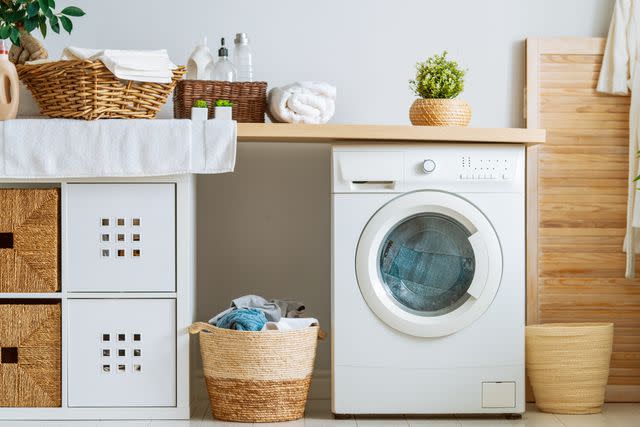Most Major Home Appliances Last Only 11 Years—Here's How to Increase Their Lifespan
With routine care, you can extend the average life cycle of these costly machines.

contrastaddict / GETTY IMAGES
If you've ever had to replace a major home appliance, like a refrigerator or washing machine, you're probably hoping that you never have to do so again—but unfortunately, these big-ticket machines aren't once-in-a-lifetime time purchases. Though they can often be repaired, our home's appliances have finite lifespans. And since they're the backbones of our homekeeping and cooking routines, it's important to know how long you can expect these costly machines to last so you aren't blindsided when your handyman explains that your stubborn fridge leak has turned into a larger problem.
As it turns out, many home appliances do have an average life cycle—and luckily, there are a few things you can do to extend it.
Related: 8 Outdated Kitchen Appliance Trends to Avoid for Your Remodel, According to Experts
How Long Major Appliances Last
According to data provided to us by the Association of Home Appliance Manufacturers, most major home appliances last from 10.5 years to 11.5 years. That includes your dishwasher (11.4 years), refrigerator and freezer (11.5 years), washer and dryer (11 years), and oven, range hood, and stove (10.5 years).

Choreograph / GETTY IMAGES
How to Make Your Appliances Last Longer
While these numbers provide a general guideline for how long your major appliances last, there are some ways you can extend their lifespan.
Dishwasher
Caring for your dishwasher the right way will keep your machine running at top performance for longer. "We recommend it be cleaned about every three to six months depending on how often you run the dishwasher and if you scrape your plates before starting the wash," says Bree Lemmen, kitchen brand manager for Whirlpool. If your dishwasher has a filter, it’s important to routinely clean it with vinegar and baking soda or a cleaner designed for dishwashers.
Refrigerator
Regularly cleaning and replacing your refrigerator's filter is key to keeping it in optimal condition—but it's important to pay attention to a few key signs of distress and call in the experts as soon as you see (or hear) them. "If you notice your fridge is making loud noises, not cooling properly, or failing to make ice, and no solutions are helping, these might be signs you need to replace your fridge," says Lemmen. "However, seeking professional help is recommended before replacing your appliance."
Related: How to Clean Under Your Refrigerator, Stove, and Dishwasher
Freezer
To enhance the lifespan of your freezer, reduce how hard it has to work to keep your food frozen. "To make sure your freezer isn't working overtime, frequently clean the freezer and air vents and check for frost build-up," says Lemmen. It's just as important not to over-fill your freezer, which could cause additional strain, she adds.
Washer
While many people overlook their washer when it comes to household cleaning, regularly servicing this appliance will improve its longevity. "We recommend cleaning your washing machine about once a month or about every 30 cycles to prevent build-up and soils," says Morgan LaLonde, laundry brand manager for Whirlpool. "Frequent cleaning can help prevent soils and build-up that would ultimately deteriorate an appliance."
Dryer
Routinely cleaning your dryer won't just help it last longer, but it can also reduce the likelihood of causing a fire. "If you notice residue and lint build-up, it's likely time to clean your dryer vent," says LaLonde. "Your dryer will likely not function as well if you do not clean the vent properly, and could potentially damage the appliance or improperly dry your clothing."
Keep in mind though that each part of your dryer has different cleaning requirements. For example, dryer vents and ducts may only need maintenance every two years, while the dryer lint screen should be cleaned after every load.
Range Hood
Range hoods can get dirty quickly, as they're designed to absorb cooking grease and smoke. "Cleaning the range hood inside and out is important for maximum lifespan," says Lemmen. "The filters should be frequently replaced or cleaned, depending on the appliance." If your range hood isn't absorbing smoke and odors like it should be, that may be a sign of grease build-up. If cleaning doesn't remedy this, it may be time to replace the appliance.
Oven
Your oven lasts the longest when it's treated with care. "Cleaning your oven frequently and properly is a great way to keep it in top condition," says Lemmen. Some stoves have a steam clean option that uses heat and water to soften the grime inside the appliance—this is a great option to use between deep cleans.
Stove
Like your oven, your stovetop and burners should be cleaned regularly to ensure the appliance runs properly. "If it's taking the oven or stove too long to heat up, that is an early sign it may be time for replacement," says Lemmen.

